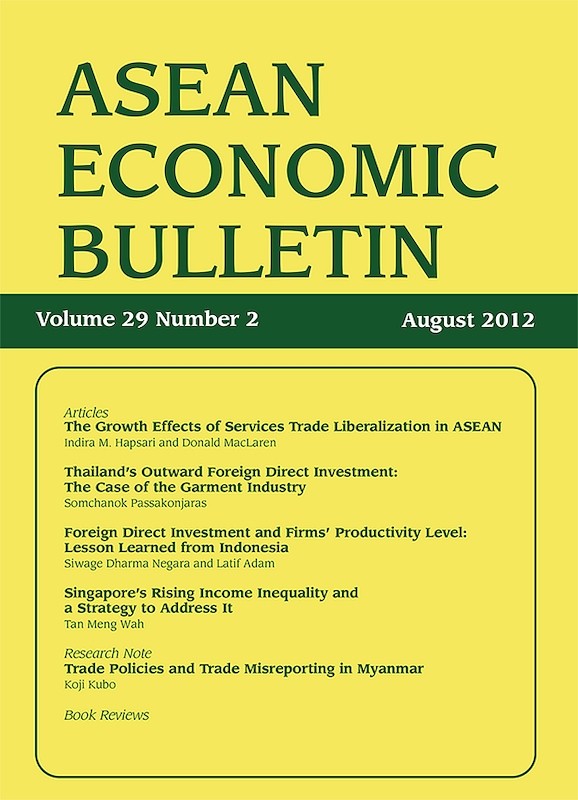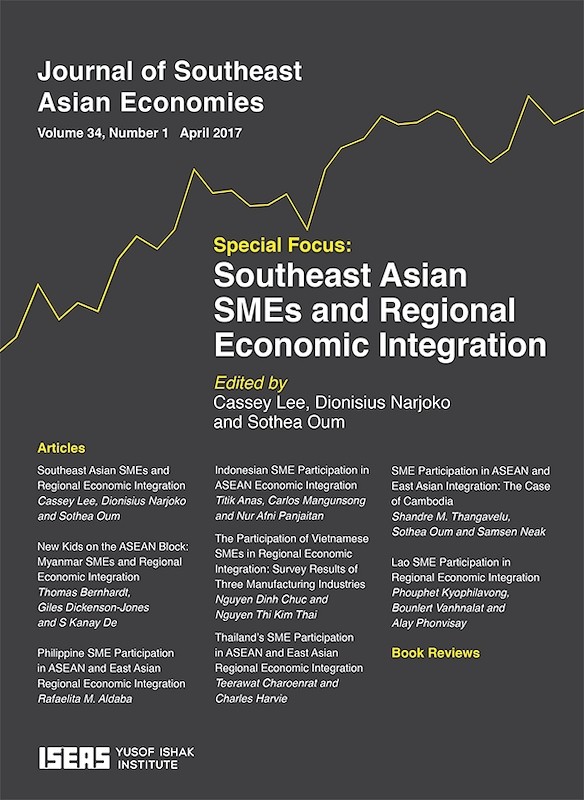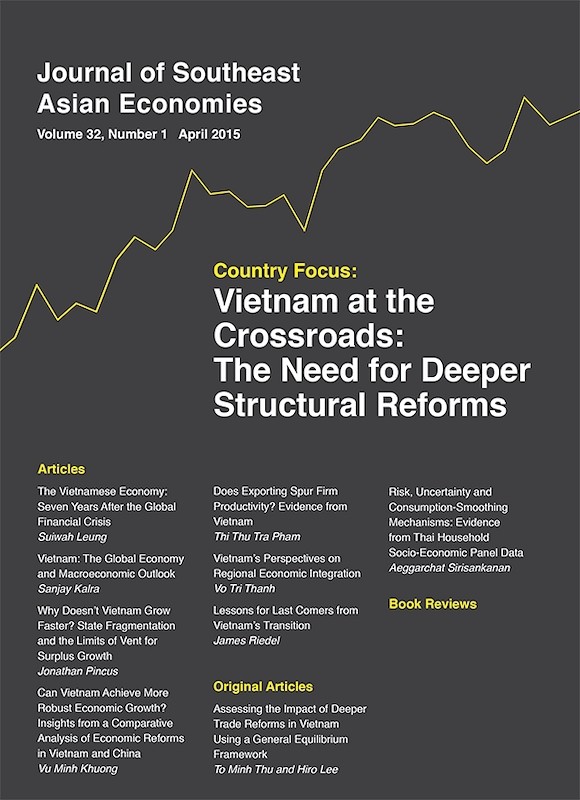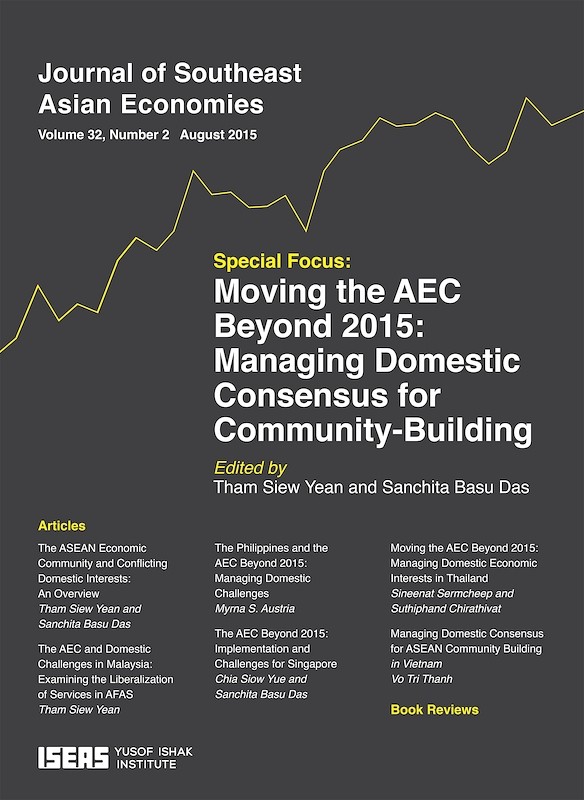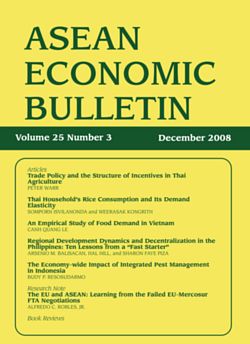Journal of Southeast Asian Economies Vol. 33/1 (Apr 2016).
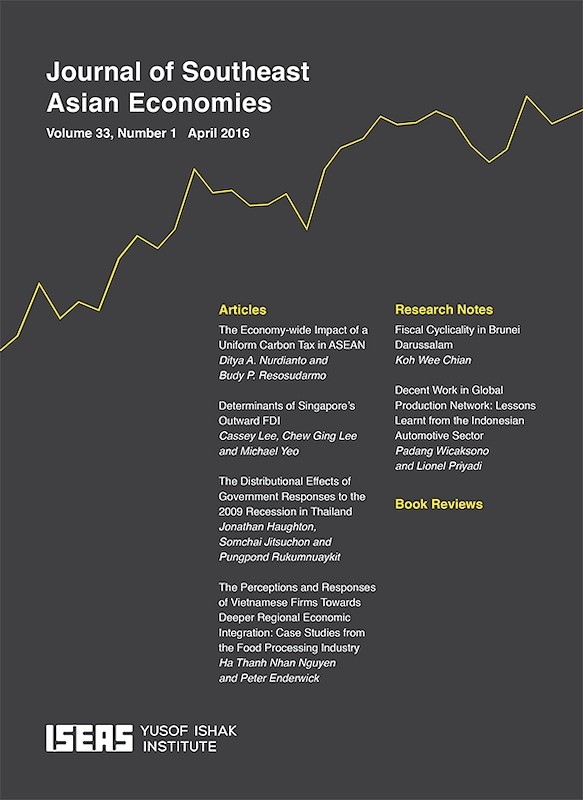
Date of publication:
April 2016
Publisher:
ISEAS – Yusof Ishak Institute
Number of pages:
124
Code:
AE33/1
Contents
-
Journal of Southeast Asian Economies Vol. 33/1 (Apr 2016).
[Whole Publication, ISSN: 23395206] -
Preliminary pages
- ARTICLES
-
The Economy-wide Impact of a Uniform Carbon Tax in ASEAN, by Ditya A Nurdianto, Budy Resosudarmo, authors see abstractThe main goal of this study is to analyse the benefits and losses associated with cooperation among ASEAN members in mitigating their CO₂ emissions, particularly by implementing a uniform carbon tax across ASEAN. To achieve this goal, this paper uses a multi-country computable general equilibrium model for ASEAN, known as the Inter-Regional System of Analysis for ASEAN model. This study finds that the implementation of a carbon tax scenario is an effective means of reducing carbon emissions in the region. However, this environmental gain could come at a cost in terms of GDP contraction and reduction in social welfare, i.e. household income. Nevertheless, Indonesia and Malaysia can potentially gain from the implementation of a carbon tax as it counteracts price distortions due to the existence of heavy energy subsidies in these two countries.
-
Determinants of Singapores Outward FDI, by Cassey Lee, Lee Chew Ging, Michael Yeo Chai Ming, authors see abstractOutward foreign direct investment (OFDI) has been an important element in Singapore’s economic strategy since the 1990s, with the government providing direct and indirect support to the internationalization process. Recent OFDI trends indicate that China has become an important destination for Singapore. In ASEAN, Singapore’s main investment markets are Indonesia, Malaysia and Thailand. Singapore’s OFDI has important sectoral dimensions, supported by evidence from econometric analysis. It is also important to distinguish between OFDI stock and flows.
-
The Distributional Effects of Government Responses to the 2009 Recession in Thailand, by Jonathan Haughton, Somchai Jitsuchon, Pungpond Rukumnuaykit, authors see abstractThis paper explores the extent measures taken by the government of Thailand helped households cope with shocks caused by the 2009 recession. A counterfactual was created by: quantifying the effects of the shocks (to tourism and exports); applying a Social Accounting Matrix multiplier analysis to simulate the indirect and induced effects; and mapping the sectoral changes to household incomes using data from the Socio-economic Surveys. The effects of the stimulus package introduced in early 2009 were then superimposed on the effects of government spending. The shocks alone would have directly reduced labour income by 2.1 per cent, or by up to 7.8 per cent if indirect and induced effects were included. Government measures raised household incomes by about 0.9 per cent on average, offsetting the shocks to some extent. The measures especially helped poorer households. On average, those in the lowest decile and those living in rural areas gained.
-
The Perceptions and Responses of Vietnamese Firms Towards Deeper Regional Economic Integration: Case Studies from the Food Processing Industry, by Ha Thanh Nhan Nguyen, Peter Enderwick, authors see abstractIncreasing regional economic integration amongst ASEAN member countries, and the creation of the ASEAN Economic Community (AEC) will bring both opportunities and challenges for local firms. This research investigates the perception and understanding of five Vietnamese food processing companies towards the AEC as well as their planned responses towards deeper integration. Case study interviews revealed that respondents had a limited understanding of the AEC, which moderated their strategic responses. Opportunities identified include access to new markets, the possibility of exploiting regionwide resources, and access to regional value chains. Increased competitive pressure, particularly from foreign investors, was the key anticipated challenge. Business responses focused on increasing intra-regional exports, cooperating with potential partner organizations, improving products and processes, and revising marketing strategies. Respondents also believed that the Vietnamese government could do more to support their businesses in the face of deepening economic integration.
- RESEARCH NOTES
-
Fiscal Cyclicality in Brunei Darussalam, by Koh Wee Chian, author see abstractThis paper examines the conduct of fiscal policy in Brunei from 2003Q1 to 2014Q2, focusing on the cyclical patterns in government expenditure. The results from a structural vector autoregression model provide evidence that fiscal policy in Brunei is procyclical, which has an expansionary effect on output and thus exacerbates the business cycle. This behaviour is primarily driven by procyclical current expenditure while capital expenditure is largely acyclical. The government should exercise caution to avoid adding cyclical pressures to the economy already afflicted by volatile oil prices. A key policy recommendation would be to adopt clear fiscal rules and better integration of the reserve funds in the budgetary framework to delink government spending from volatile oil revenues.
-
Decent Work in Global Production Network: Lessons Learnt from the Indonesian Automotive Sector, by Padang Wicaksono, Lionel Priyadi, authors see abstractDespite growing investment from leading automotive makers, particularly Japanese companies, the Indonesian automotive sector is still struggling to ensure decent work. This article makes a particular attempt to analyse the close links between Decent Work (DW) and Global Production Networks (GPNs) in the Indonesian automotive sector, whilst scrutinizing the existing literature that has covered the two concepts in separate frameworks. More specifically, this article examines the employment opportunities and adequate earnings of local employees within the DW framework in the country’s automotive sector with the expansion of GPNs. It finds that although there were greater opportunities for skilled workers to upgrade capabilities and enjoy improved welfare outcomes, there are still many more less-skilled workers remaining in precarious conditions.
- BOOK REVIEWS
-
BOOK REVIEW: A World Trade Organization for the 21st Century: The Asian Perspective, edited By Richard Baldwin, Masahiro Kawai and Ganeshan Wignaraja. , by Deeparghya Mukherjee, author
-
BOOK REVIEW: Inequality in Asia and the Pacific: Trends, Drivers and Policy Implications, edited by Ravi Kanbur, Changyong Rhee and Juzhong Zhuang. , by Hwok-Aun Lee, author
-
BOOK REVIEW: ASEAN Economic Community: A Model for Asia-wide Regional Integration? edited by Bruno Jetin and Mia Mikic, by Christoph Casimir Odermatt, author
-
BOOK REVIEW: Emerging Capitalism in Central Europe and Southeast Asia: A Comparison of Political Economies, by Franois Bafoil, translated and revised by Michael OMahony and John Angell, by Edo Andriesse, author
-
BOOK REVIEW: Promises and Predicaments: Trade and Entrepreneurship in Colonial and Independent Indonesia in the 19th and 20th Centuries, edited by Alicia Schrikker and Jeroen Touwen, by Siwage Dharma Negara, author
-
BOOK REVIEW: Economic Growth and Employment in Vietnam, by David Lim, by Nguyen Dinh Chuc, author
-
BOOK REVIEW: 2014 Provincial and Inaugural Regional Competitiveness Analysis: Safeguarding Indonesias Growth Momentum, by Tan Khee Giap, Nurina Merdikawati, Mulya Amri and Tan Kong Yam. , by Robert L Curry, Jr., author

